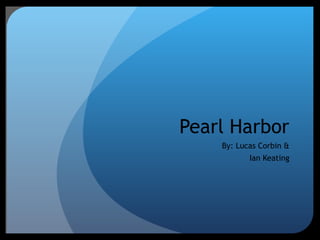
Pearl Harbor
- 1. Pearl Harbor By: Lucas Corbin & Ian Keating
- 2. Pearl Harbor Pearl Harbor is where the U.S. pacific fleet was destroyed by the Japanese. The Japanese made a surprise attack on December 7, 1941 The bombing by Japanese airplanes killed over 2,000 service men aboard the ships
- 3. Pearl Harbor On December 6, 1941 president Roosevelt made a final peace attempt to the emperor of Japan, but the emperor never replied. The same day a Japanese message was intercepted by U.S. code breakers. The Americans believed that a Japanese attack was imminent, but they weren’t sure where the Japanese would attack.
- 4. Pearl Harbor On December 7, 1941 code breakers decoded another message The message instructed the Japanese embassy to deliver the message to Americans at 1 p.m. The U.S. War Department sent an alert message to Pearl Harbor to warn them of the attack. The alert message wasn’t received until four hours after the attack began.
- 5. Pearl Harbor The Japanese attack force had six carries with 423 planes. They launched their first wave of 183 planes The U.S. radar station on Hawaii detected the planes, but thought they were only the expected American B-17 planes from the west coast.
- 6. Pearl Harbor After the first wave launched, the second wave of 167 planes also took off for the harbor The first wave reached the harbor at 7:53 and began attacking the U.S. battleships and airfields.
- 7. Pearl Harbor The second wave arrived shortly after the first wave. They focused on taking out other ships and shipyard facilities. The waves of Japanese attack forces launched torpedoes, dropped bombs, and used other military tactics to destroy their targets.
- 8. Pearl Harbor By 9:45 a.m. the Japanese were finally done attacking. Five battleships were sunk and eight were damaged. The U.S. also lost 188 aircrafts when the Japanese attacked the U.S. airfields.
- 9. Pearl Harbor The servicemen aboard the ships stood no chance against the well prepared Japanese war planes. Many military men were trapped in the ships and couldn’t get out to help fight. Most of the men that were trapped in the ships never made it out alive.
- 10. Pearl Harbor One of the reasons why the attack on Pearl Harbor was so catastrophic is because the harbor was completely surprised. The anti-aircraft guns were unmanned and the ammunition for them was locked away because it was during a peacetime. Servicemen were ashore because it was a Sunday and aircrafts were parked wing tip to wing tip at the airfields.
- 11. Pearl Harbor News of the attack spread across the nation the same day. It shocked the American people and influenced many young people to join the military. The attack ended the U.S. period of isolation. The next day December 8, 1941 the U.S. declared war on Japan. President Roosevelt said, “December 7, 1941 is a date which will live in infamy.”